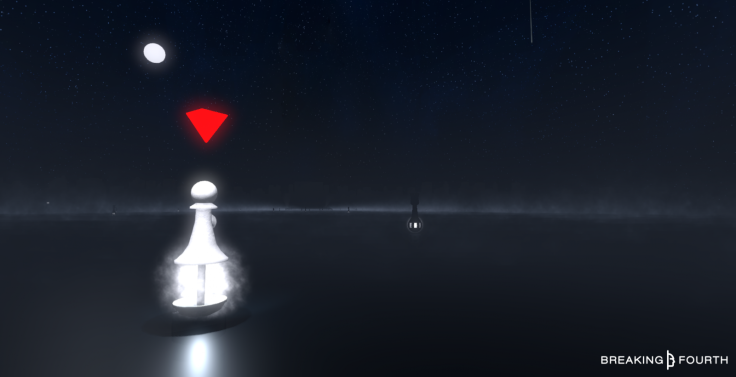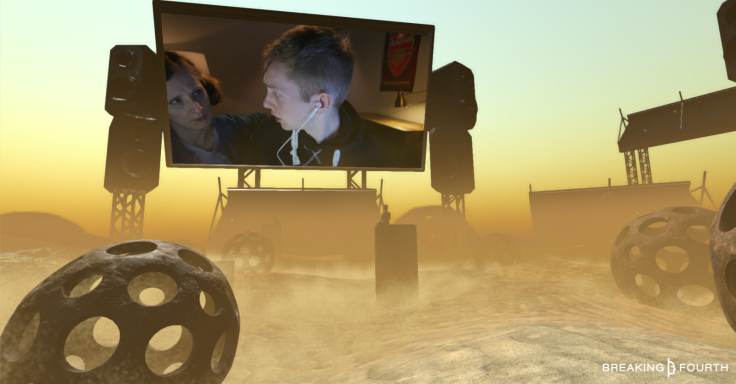Ctrl: Breaking Fourth's virtual reality drama is a lesson in VR storytelling done right
VR needs better storytelling, but there's a fine line to tread between immersion and consternation.

Virtual reality has a tricky task on its hands. How do you appeal to an older, less tech-savvy generation who have no interest in strapping a piece of apparatus to their heads purely for kicks? For that matter, how do you appeal to anyone, young or old, who just isn't interested in gaming?
In its current state, VR has niche appeal. The majority of content available to headsets relies on spectacle for creating a sense of immersion, bombarding users with sound and visuals to distract them from their real-world confines. From our experience, such immersion only lasts as long as the headset is worn: once the goggles are off, you're instantly snapped back to reality and the experience quickly fades away.
Storytelling, meanwhile, remains a largely neglected aspect of VR content creators' repertoires. Sure, some of the better-made virtual reality games have storylines, but these mostly consist of a threadbare plotline only included to justify your presence in a fantastical VR world. Meanwhile, empathetic storytelling – that is, stories that allow you to put yourself in the shoes of a character and understand their motives and emotions – remains noticeably absent from VR's content library. This is exactly the type of storytelling virtual reality needs to reach wider audiences, by making it a recognised artistic medium.
Companies are still trying to figure out how to nail VR storytelling, but Breaking Fourth, a London-based virtual reality theatre start-up, is one of the first to make a really good stab at it. Their debut production, Ctrl, is currently being shown at the Royal Academy of Dramatic Art (RADA) Studios in London and is being pegged as the one of the first pieces of theatre to be shot entirely in virtual reality. IBTimes UK was graciously invited to a viewing during the play's opening week.

After arriving at the studio in Chenies Street, we're ushered down into a small, dimly-lit basement room. There's no stage to speak of. Instead, 20 or so plastic swivel chairs sit spread out, each with a Samsung Gear VR sitting on top of it. We're told to sit down but not to touch the headsets. It's a jarring experience – with nothing to focus on, audience members are left to throw awkward glances at each other and spin absent-mindedly in their seats.
Fortunately, the tension is soon broken with the arrival of Dom "The Dominator" Williams, who bursts into the room – in character - to introduce himself as the host for the coming proceedings. Dom will be our commentator for the evening, and after a brief explanation of how to use the headset, we put them on and the play begins.
Ctrl's story centres around a teenage boy called Liam who's competing in an eSports tournament for a futuristic computer game that feels part chess, part Hunger Games. He's through to the final rounds, and there's prize money up for grabs. Liam wants to win the money so he can buy a new house for him and his mum.

Control
As we watch him play from a bedroom in his mother's flat, details begin to emerge that point to a troubled home life. Our introduction to his mother, who flits nervously about the house and occasionally appears on-screen behind Liam, further adds to the sense that Liam's household isn't a happy one. This feeling of unease gathers pace throughout the rest of the play, before arriving at climax that's dark, shocking and unexpected.
Crtl is fresh, exciting and fun, but also sad and troubling. In virtual reality, the sense of being right there gets you more involved in the story than you would watching it on a television screen, meaning what you experience has a much stronger effect on you. While this a tool developers will need to make full use of to create meaningful stories in VR, it's also one they must handle with care. Virtual reality is new and uncharted territory for storytellers, and its limits are yet to be tested.
Fortunately, Ctrl handles its sombre subject matter with grace, while also managing to walk the fine line between immersion and escapism. But it's a very precarious balancing act, and those who disregard it in favour of shock tactics risk ostracising the wider audience virtual reality must target if it is to be a success.
Ctrl is currently showing at RADA Studios in London. You can buy tickets here.
© Copyright IBTimes 2025. All rights reserved.






















